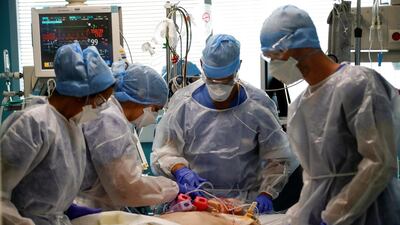France appears on the brink of losing its battle to prevent a second wave of coronavirus as cases surge and public unrest over the government's response grows.
The disquiet has prompted an intervention from President Emmanuel Macron who said on Friday that the response needs to be “lucid, very transparent, demanding but at the same time proportionate."
Despite Mr Macron’s call for calm, the French Covid maelstrom could now be further provoked by an announcement from its public health agency that deaths have started to rise for the first time since the end of lockdown in May.
265 people died from the virus this week compared with 129 the last, agency data reveal, taking total deaths from the pandemic in France to 31,095.
Whilst a recent surge of infections mostly affected the young, infections are also growing fast among the over-75s. And this trend has seen admissions to hospital and intensive care wards increase, the agency said.
The spike has placed French hospitals onto emergency footing. This morning French broadcaster RBS tweeted that “Marseille hospitals are launching a distress call: between their general activity and the management of new cases of Covid19, the situation is tense in the services.”
The number of new infections was down by eight per cent from the previous week but any stirrings of hope at the decrease were quashed by the agency which warned that this was likely an "underestimate" of infections due to saturation of testing capacity in certain regions.
Testing furore leads to unrest
There is growing concern too about how hard it is to get a test - especially in the Paris region - due to demand. The shortage led prime minister Jean Castex to admit last week that his government must do better.
The testing turmoil has already seen overwhelmed French testers go on strike while in Marseille on Thursday crowds gathered to protest over school closures precipitated by the striking testers.
In the absence of a functional testing regime, health minister Olivier Veran said on Thursday that France is preparing tighter restrictions in several cities to curtail the Covid surge after daily infections topped 10,000 twice over the last week. In the last 24 hours, health ministry figures have revealed that cases have shot up by 10,593.
The proclamation has already been brought to bear in the French Riviera town of Nice, where restrictions announced on Friday include a maximum of groups of 10 people allowed to gather in its parks and on its beaches.It will also be forbidden to buy or consume alcohol in public in the city after 8pm while bars can no longer open all night. And authorities are lowering the ceiling for attendance at big public events to 1,000 people from 5,000 previously.
The French legislature will be anxiously hoping news of new, more rapid saliva tests announced by Mr Veran on Thursday prove feasible. An announcement is expected later on Friday.
The jump in French infections of more than 10,000 on Thursday was the most eye-catching figure among increases elsewhere in Europe, with new cases in Germany increasing by more than 2,000 on Friday, the most since late April.
Portugal on Thursday reported the most new infections in five months, with 770, while Spanish cases rose at a slower pace than the previous day but still by more than 4,500.
Health officials blame the increase on social gatherings, especially among younger people, and on travellers bringing the virus back from vacation. The upward trend threatens to derail Europe’s tentative revival, should governments be forced to further tighten restrictions on movement.
Reluctance to take draconian route
Politicians are reluctant to reimpose strict lockdowns as it would likely alienate voters already fed up with more than six months of disruption to daily life, but they may be forced into action if the disease can’t be brought under control.
UK Health Secretary Matt Hancock on Friday declined to rule out a second national lockdown and said the acceleration of cases and hospital admissions across Britain represents a “big moment.” The UK’s daily caseload averages more than 3,300 over the past week, putting infections at a level not seen since May.
“The pandemic is back in most of our countries,” German economy minister Peter Altmaier said before a video conference with European Union counterparts. “We have to make sure that the trend toward recovery in Europe isn’t impeded and threatened by the rising infection numbers.”
Speculation swirled Friday that the Spanish government may be forced to put the Madrid region back into some kind of lockdown and possibly reimpose a state of emergency. Spain is in the top 10 globally of countries with the most active Covid cases, as this table shows.
And Ireland is expected to declare that most bars in Dublin will be closed from Saturday and that travel into and out of the city will be restricted. Austria is banning indoor gatherings of more than 10 people from Monday after bars, clubs and private parties fuelled new infections.
Greece is also ready to announce Friday a second package of measures in four days to contain the spread of the virus in the region of Attica, including the capital Athens, according to Prime Minister Kyriakos Mitsotakis.
“It is clear that there is an issue with the coronavirus in Attica that needs to be addressed,” Mitsotakis said. Measures are likely to include limits on public gatherings and the suspension of cultural events for 14 days, as well as efforts to encourage working from home in both public and private sector.

